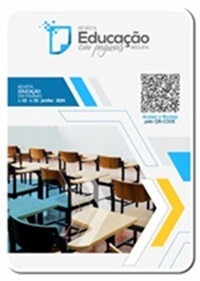Neurodidactics and chess: pathways for teacher training in early childhood education
DOI:
https://doi.org/10.22481/redupa.v3.15632Keywords:
chess, neurodidactics, executive functions, working memory, teacher trainingAbstract
Educational systems in Latin America focus on consolidating teacher´s transformation practices thanks to teacher training and professional development sessions. This aspect is a fundamental strategy for optimizing the quality of education. Teachers focus on reinventing their work and improving the relevance and significance of their performance. This article analyzes the different perspectives of authors who explain training strategies for normalist teachers in a context where pedagogical practices are transversalized by neurodidactics practices and the use of chess as a didactical tool. This investigation is based on a qualitative study; the state-of-the-art concept supports the background of initial training in early childhood education. The literature review supports the initial training processes of teachers in their context modeling educational practices in which the strengthening of their executive functions is based on the experience of playful, experiential, and interactive learning experiences.
Downloads
References
BAUSELA HERRERAS Enrque. La atención selectiva modula el procesamiento de la información y la memoria implícita [Selective attention modulates information processing and implicit memory]. Acción Psicológica, v. 11, n. 1, p. 21-34, 2014. Disponível em: http://dx.doi.org/10.5944/ap.1.1.13789. Acesso em: 25 nov. 2024.
CAMPOS, Ana Lucía. Neurociencias, desarrollo y educación. 2010. Disponível em: http://portal.oas.org/LinkClick.aspx?fileticket=Xnvh2-5kpmI%3D&tabid=1282&mid=3693. Acesso em: 12 jan. 2018.
CODEA, A. Neurodidática, fundamentos e princípios. Rio de Janeiro: Editora Wak, 2019.
CASTILLERO, Omar. Las funciones ejecutivas del cerebro humano. 2017. Disponível em: https://psicologiaymente.com/inteligencia/funciones-ejecutivas. Acesso em: 25 nov. 2024.
DIAMOND, Adele. Executive Functions. Annual Reviews, 2013.
GIBBS, Graham. El análisis de datos en investigación cualitativa. Madrid: Morata, 2012.
KASPAROV, Gany Kimovick. Cómo la vida imita al ajedrez. Tradução de M. Roca. Barcelona: Grijalbo, 2007.
LA INVESTIGACIÓN EN EDUCACIÓN Y PEDAGOGÍA. Cooperativa Editorial Magisterio, 2003.
MINISTERIO DE EDUCACIÓN NACIONAL. Decreto 1236 de 2020. Bogotá: Ministerio de Educación Nacional, 2020.
MORA, Francisco. Neuroeducador: Una nueva profesión. Madrid: Alianza, 2019.
PÉREZ BALZA, Zheila; MONTES ALFARO, Irina Luz; DEL CARMEN FONSECA MORA, Korona; DEL ROSARIO PINEDA ROBAYO, Adriana. Las funciones ejecutivas del docente: camino para reconfigurar saberes y prácticas pedagógicas. Panorama, v. 16, n. 31, 2022. Disponível em: https://www.redalyc.org/articulo.oa?id=343971615004. DOI: https://doi.org/10.15765/pnrm.v16i31.3309. Acesso em: 25 nov. 2024.
OLDI, A. Las funciones ejecutivas: hacia prácticas educativas que potencien su desarrollo. Revista de Educación, p. 72-98, 2015. Recuperado em: 29 nov. 2020. Disponível em: http://www.scielo.edu.uy/scielo.php?script=sci_arttext&pid=S168874682015000100003&lng=es&tlng=es. Acesso em: 25 nov. 2024.
PERRENOU, Philippe. Desarrollar la práctica reflexiva en el oficio de enseñar. Barcelona: Editorial Grao, 2004.
POLGAR, Judit. A Game of Queens. Edinburgh: Quality Chess UK LLP, 2014.
PORTELLANO, José. Introducción a la Neuropsicología. Madrid: MacGraw Hill, 2005.
TARDIF, Maurice. Saberes docentes e formação profissional. 14. ed. Petrópolis: Vozes, 2014.
TIRAPU-USTÁRROZ, J. G.-M.-L.-R.-V. Models of executive control and functions. Revista de Neurología, 2008.
TIRAPU USTÁRROZ, J. ¿Para qué sirve el cerebro? 2. ed. Sevilla: Editorial Desclée de Brouwer, 2010. Recuperado de: https://www.casadellibro.com/ebook-para-que-sirve-el-cerebro-ebook/9788433033512/2272409. Acesso em: 25 nov. 2024.
Downloads
Published
How to Cite
Issue
Section
License
Copyright (c) 2024 Revista Educação em Páginas

This work is licensed under a Creative Commons Attribution 4.0 International License.






